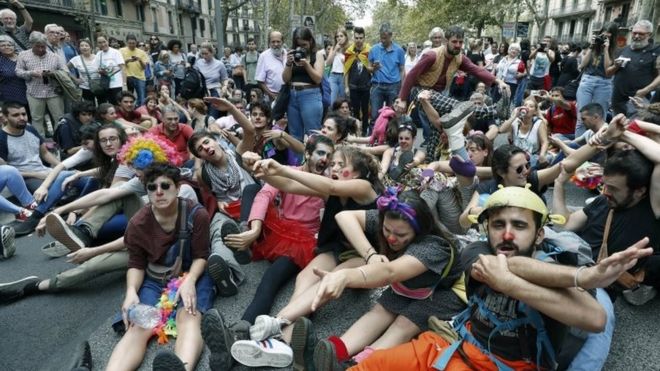Catalan crisis: Spanish court bars MPs' independence move
The court said such a move would be "a breach of the constitution".

Earlier Prime Minister Mariano Rajoy warned Catalonia's regional government against declaring independence after a disputed vote last Sunday.
Catalan leader Carles Puigdemont had indicated that he could make such a declaration at next week's session.
The court's ruling on Thursday upheld a challenge not from the government in Madrid, but by the Socialists' Party of Catalonia, which opposes secession from Spain.
Allowing the regional parliament to meet and declare independence, the court said, would violate the rights of the party's MPs.
An earlier ruling by the court aimed at stopping Sunday's vote was ignored by Catalonia's leaders. That challenge to the court had come from Spain's government, which condemned the referendum as illegal.
The socialists won almost 13% of the vote in the 2015 election, and has 13 MPs in the 135-seat regional parliament.
Organisers of Sunday's vote put the turnout at 42%, with 2.2 million people taking part. They say 90% voted for independence, however they have not published final results. There have been several claims of irregularities.
There was violence at polling stations as police, trying to enforce a Spanish court decision to ban the vote, attempted to seize ballot boxes and disperse voters.
Also on Thursday, Sabadell, a major bank, decided to transfer its legally registered base from Barcelona to the south-eastern Spanish city of Alicante. Its HQ and workforce will remain in Barcelona.
Catalan bank moves legal HQ
CaixaBank, another large Barcelona-based institution, is reported to be considering a similar move. This would ensure the banks remained within the eurozone and under the supervision of the European Central Bank.
The captain of Barcelona Football Club, Andres Iniesta, appealed for dialogue. "Do it for all of us. We deserve to live in peace," the 33-year-old said in a Facebook post.
Rajoy's gambit
Analysis by BBC Europe Editor Katya Adler, Madrid
Mariano Rajoy is famous for his "wait-and-see" attitude in crises. He's more of a technocrat than a passionate politician. So far, it's served him well. While not wildly popular, he remains very much in control of Spain's central government.
But the Catalan question is risky for him. His apparent inertia this week is coming under fire from the Spanish left - who want him to start a dialogue with Catalan separatists - and the harder right who want him to take immediate action, shutting the Catalan government down, bringing the reins of power back to Madrid. Spaniards call it "the nuclear option".
In a nod to them on Thursday, Mr Rajoy warned of "greater damage" if Catalan separatists went ahead with a unilateral declaration of independence. Spain's constitutional court has now banned Monday's meeting of the Catalan parliament where that declaration was expected to be made.
While this may appear a setback for the separatists, they have ignored court rulings before. But Mr Rajoy hopes the weight of Spanish law will now serve to divide Catalonia's pro-independence parties - which range from the moderate to the radical - and weaken their resolve.
[BBC SOURCES]


No comments